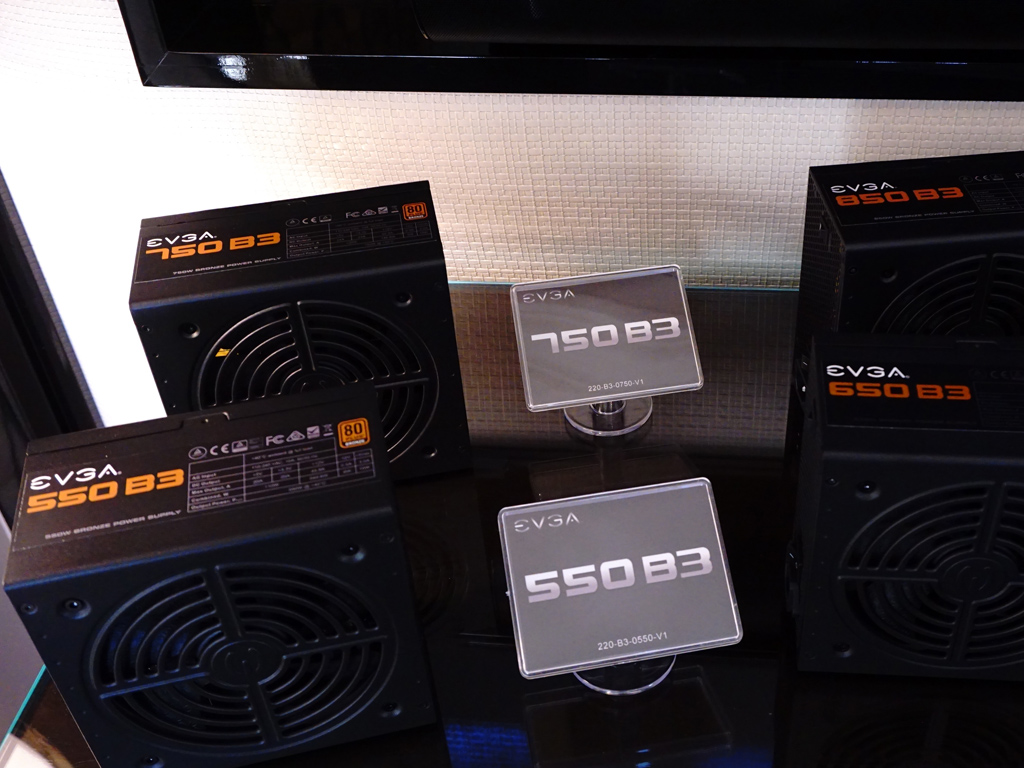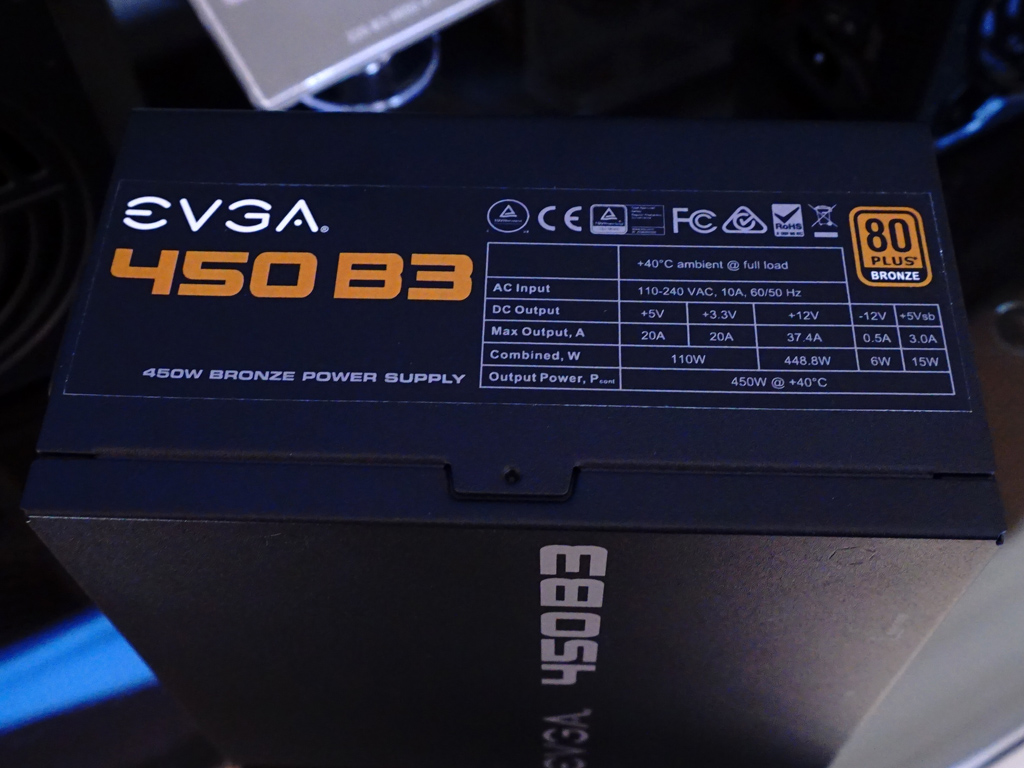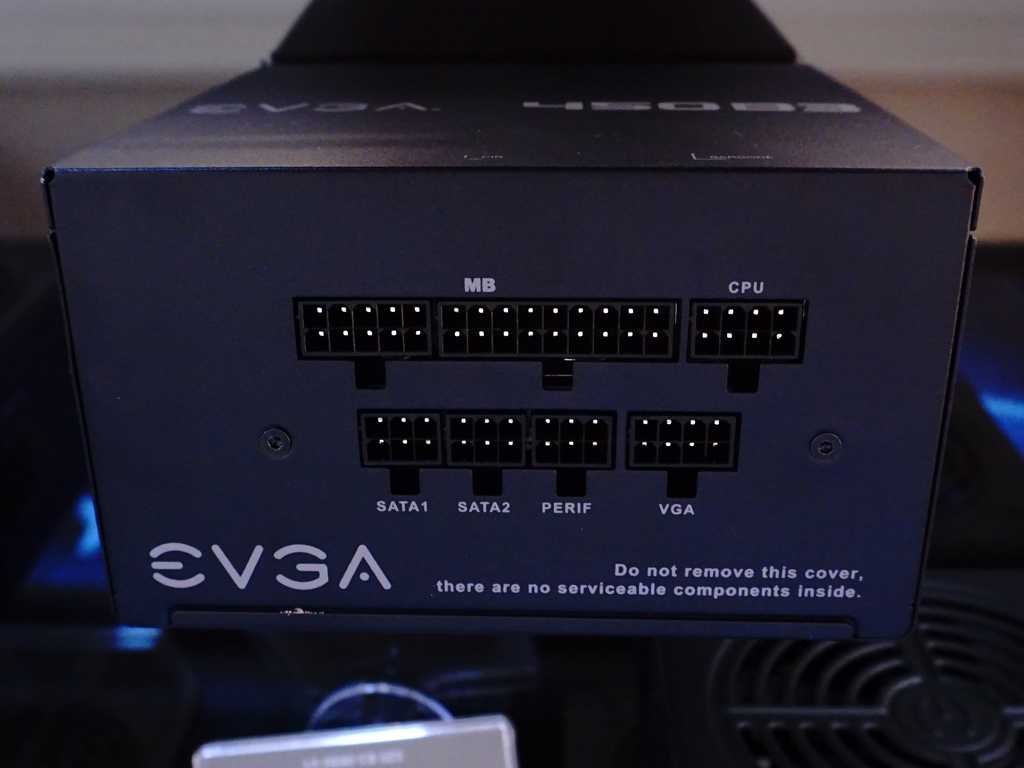Budget EVGA B3 PSU Line Will Compete With Corsair's CX Family
We noticed a new budget PSU line, the B3, in EVGA's suite at CES. It has five members, with capacities ranging from 450W to 850W.
EVGA's new B3 line will be the successor of the B2, and currently it's positioned between the GQ (FSP OEM) and BQ (HEC and Andyson OEMs) lines. The platform, which all B3 units use, was designed by Super Flower, although we can't know for sure in which factory those PSUs will be actually made--it could be SF's own factory, or somewhere else (eg, RSY). The efficiency is 80 PLUS Bronze for all B3 models.
The lowest member of the B3 line has 450W capacity, addressing mainstream systems, whereas the strongest one has 850W max power. The expected street prices will start from $40 for the 450 B3, with a $10 increase for every additional 100W of power until you get to the 750 B3, which will be around $75. The 850 B3 will start at $85. Those prices put the B3 line against Corsair's CX units, and the fight is expected to be tough.
The key feature of the B3 models is that they are fully modular, something uncommon for budget PSUs. The bulk caps on those units are provided by a Japanese manufacturer, and the cooling fan uses a Hydro Dynamic Bearing (HDB), which lasts much longer than a sleeve bearing. The cooling fan will be supported by an ECO mode, which will deactivate the fan under light and moderate loads in order to offer a more silent operation. The protection features include everything you can imagine, even OTP (Over Temperature Protection). Finally, the provided warranty is set at five years, which is a satisfactory period for a budget-oriented product.
The three lower members of the B3 line come with a couple of PCIe connectors, whereas the 750 B3 has four, and the 850 B3 six. None, however, has two EPS connectors; they each have just one. In our opinion, at least the 850 B3 should be equipped with a couple of EPS connectors in order to support high-end mainboards.
The 450/550/650 B3 models have 150mm depth; the 750/850 B3 units are a little larger at 160mm. We expect the B3 models to be available sometime in Q1.
Get Tom's Hardware's best news and in-depth reviews, straight to your inbox.

Aris Mpitziopoulos is a contributing editor at Tom's Hardware, covering PSUs.
-
SVstorm Considering that Corsair PSU are rebranded Seasonic I would go with a Corsair over EVGA every time. That is if I ever went with something other then a Seasonic to begin with.Reply -
dstarr3 A $40 SuperFlower PSU would be absolutely amazing. Sounds a bit too good to be true, though.Reply -
shrapnel_indie ReplyEVGA's new B3 line will be the successor of the B2, and currently it's positioned between the GQ (FSP OEM) and BQ (HEC and Andyson OEMs) lines. The platform, which all B3 units use, was designed by Super Flower, although we can't know for sure in which factory those PSUs will be actually made--it could be SF's own factory, or somewhere else (eg, RSY). The efficiency is 80 PLUS Bronze for all B3 models.
Wait....WHAT??? Man... HEC and Anydson is behind the BQ model? Uh, I certainly hope it isn't built to their normal quality and design.
19137578 said:Considering that Corsair PSU are rebranded Seasonic I would go with a Corsair over EVGA every time. That is if I ever went with something other then a Seasonic to begin with.
Not all Corsairs are re-branded Seasonics. After all Seasonic wouldn't have designed and built the old "Builder Series" PSUs that can be so problematic after the expiration of their 3 year warranty. (Thankfully the newer CXM units are NOT of the same cloth.) -
Lutfij Well they need to be reviewed and tested. If they show considerable reliability at the advertised price point, I'm on board otherwise I'm not going for something that's in line with a CX unit.Reply -
moncho @SVSTORM that's completely untrue. Actual CX series and the majority of the Corsair PSU lineup is made by Channel Well Technology (CWT). SeaSonic has some mediocre models like the S12II series which will (happily) be replaced this year with the new CORE and CORE+. The manufacturer is one of the poorest and less important factors choosing a good Power Supply. We will have to wait until we see the review of the magnific professional Aris.Reply -
JamesSneed Reply19137578 said:Considering that Corsair PSU are rebranded Seasonic I would go with a Corsair over EVGA every time. That is if I ever went with something other then a Seasonic to begin with.
This is not the case for a a majority of Corsair PSU's. Most of the Corsair PSU's are now made by Channel Well these days. -
dstarr3 Reply19138558 said:The manufacturer is one of the poorest and less important factors choosing a good Power Supply.
I couldn't disagree with this more. The OEM is the first thing you should research about a PSU. It's the most reliable indicator of quality or lack thereof. For instance, take EVGA's lineup. Their G2 series are all made by Super Flower, and as such they are some of the best PSUs on the market right now. The rest of EVGA's lineup? Not Super Flower, and pretty rubbish. Basically, 99% of the time, Good OEM = Good PSU. Simple as that. -
JamesSneed Reply19138627 said:19138558 said:The manufacturer is one of the poorest and less important factors choosing a good Power Supply.
I couldn't disagree with this more. The OEM is the first thing you should research about a PSU. It's the most reliable indicator of quality or lack thereof. For instance, take EVGA's lineup. Their G2 series are all made by Super Flower, and as such they are some of the best PSUs on the market right now. The rest of EVGA's lineup? Not Super Flower, and pretty rubbish. Basically, 99% of the time, Good OEM = Good PSU. Simple as that.
I see your point but PSU OEM's make stuff for other companies based on there requirements. A good vendor can and has made pretty lousy PSU's. You will see this in some pre-buildt PC's but the PC vendor knows they are going to pull say 250 watts max from said PSU so they spec out the cheapest parts they can for the PSU maker.
With that said I only go off testing from people who know what they are doing.
If there is anything anyone should take away is read tests of a PSU before you spend your money on it and make sure its really tested properly. Read a review of a PSU on TomsHardware, JohnyGuru or HardOCP to see the level of testing to expect.


